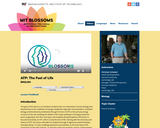
The goal of this lesson is to introduce students who are interested in human biology and biochemistry to the subtleties of energy metabolism (typically not presented in standard biology and biochemistry textbooks) through the lens of ATP as the primary energy currency of the cell. Avoiding the details of the major pathways of energy production (such as glycolysis, the citric acid cycle, and oxidative phosphorylation), this lesson is focused exclusively on ATP, which is truly the fuel of life. Starting with the discovery and history of ATP, this lesson will walk the students through 8 segments (outlined below) interspersed by 7 in-class challenge questions and activities, to the final step of ATP production by the ATP synthase, an amazing molecular machine. A basic understanding of the components and subcellular organization (e.g. organelles, membranes, etc.) and chemical foundation (e.g. biomolecules, chemical equilibrium, biochemical energetics, etc.) of a eukaryotic cell is a desired prerequisite, but it is not a must. Through interactive in-class activities, this lesson is designed to spark the students’ interest in biochemistry and human biology as a whole, but could serve as an introductory lesson to teaching advanced concepts of metabolism and bioenergetics in high school depending on the local science curriculum. No supplies or materials are needed.
- Subject:
- Biology
- Life Science
- Material Type:
- Lecture
- Provider:
- MIT
- Provider Set:
- MIT Blossoms
- Author:
- Christian Schubert
- Date Added:
- 03/18/2020